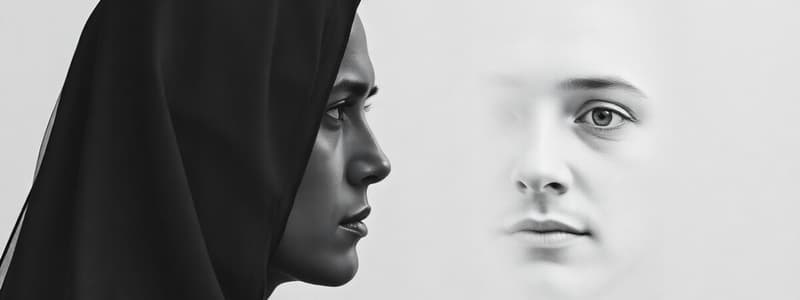Podcast
Questions and Answers
Which of the following best defines the concept of 'self'?
Which of the following best defines the concept of 'self'?
What does Aristotle's quote 'knowing yourself is the beginning of all wisdom' suggest about self-awareness?
What does Aristotle's quote 'knowing yourself is the beginning of all wisdom' suggest about self-awareness?
Which of the following is NOT a factor that shapes an individual's self?
Which of the following is NOT a factor that shapes an individual's self?
Philosophy, derived from 'Philos' and 'Sophia', primarily involves which of the following?
Philosophy, derived from 'Philos' and 'Sophia', primarily involves which of the following?
Signup and view all the answers
Which of the following best illustrates an individual's values and beliefs?
Which of the following best illustrates an individual's values and beliefs?
Signup and view all the answers
How did the Greeks contribute to the understanding of the self?
How did the Greeks contribute to the understanding of the self?
Signup and view all the answers
What is the significance of discussing different representations of the self from various disciplines?
What is the significance of discussing different representations of the self from various disciplines?
Signup and view all the answers
Which of the following aspects of self is influenced by personal experiences and relationships?
Which of the following aspects of self is influenced by personal experiences and relationships?
Signup and view all the answers
What does Aquinas believe is essential to understand self-knowledge?
What does Aquinas believe is essential to understand self-knowledge?
Signup and view all the answers
According to Catholic belief, what happens to a man who has committed sins after death?
According to Catholic belief, what happens to a man who has committed sins after death?
Signup and view all the answers
What is the primary argument of Aquinas regarding human beings?
What is the primary argument of Aquinas regarding human beings?
Signup and view all the answers
What philosophical concept is Descartes known for?
What philosophical concept is Descartes known for?
Signup and view all the answers
How does Aquinas believe humans acquire knowledge about God?
How does Aquinas believe humans acquire knowledge about God?
Signup and view all the answers
What is the relationship between matter and form according to Aquinas?
What is the relationship between matter and form according to Aquinas?
Signup and view all the answers
Which perspective represents the modern philosophical stance on the self?
Which perspective represents the modern philosophical stance on the self?
Signup and view all the answers
What is a foundational belief of Catholicism regarding the soul after death?
What is a foundational belief of Catholicism regarding the soul after death?
Signup and view all the answers
What distinguishes Augustine's belief in dualism?
What distinguishes Augustine's belief in dualism?
Signup and view all the answers
What does Descartes' statement 'Cogito Ergo Sum' imply about existence?
What does Descartes' statement 'Cogito Ergo Sum' imply about existence?
Signup and view all the answers
What does Descartes suggest about the relationship between the senses and reality?
What does Descartes suggest about the relationship between the senses and reality?
Signup and view all the answers
What characterizes David Hume's view of the self?
What characterizes David Hume's view of the self?
Signup and view all the answers
What philosophical approach is associated with David Hume?
What philosophical approach is associated with David Hume?
Signup and view all the answers
How does Augustine's 'Methodical Doubt' influence one's perception of existence?
How does Augustine's 'Methodical Doubt' influence one's perception of existence?
Signup and view all the answers
Which philosopher argued that one's perception of self is often unreliable?
Which philosopher argued that one's perception of self is often unreliable?
Signup and view all the answers
What is the primary implication of Descartes' philosophical reasoning?
What is the primary implication of Descartes' philosophical reasoning?
Signup and view all the answers
What part of the soul is associated with a person's drive towards satisfaction and pleasurable objects?
What part of the soul is associated with a person's drive towards satisfaction and pleasurable objects?
Signup and view all the answers
Which aspect of the soul is characterized by courage, competitiveness, and a desire to enact change?
Which aspect of the soul is characterized by courage, competitiveness, and a desire to enact change?
Signup and view all the answers
What term best describes Aristotle's view that the soul and body are inseparable?
What term best describes Aristotle's view that the soul and body are inseparable?
Signup and view all the answers
How does Aristotle's concept of the self differ from Plato's?
How does Aristotle's concept of the self differ from Plato's?
Signup and view all the answers
What does Aristotle define as the principle of life in the context of his philosophy?
What does Aristotle define as the principle of life in the context of his philosophy?
Signup and view all the answers
What aspect of human nature does Aristotle believe distinguishes humans from animals?
What aspect of human nature does Aristotle believe distinguishes humans from animals?
Signup and view all the answers
In the context of the appetitive soul, which of the following would likely motivate a person?
In the context of the appetitive soul, which of the following would likely motivate a person?
Signup and view all the answers
What role does the rational soul play in a person's decision-making process?
What role does the rational soul play in a person's decision-making process?
Signup and view all the answers
What do Pre-Socratic philosophers primarily seek to explain?
What do Pre-Socratic philosophers primarily seek to explain?
Signup and view all the answers
Which of the following best defines 'arché' as understood by Pre-Socratic philosophers?
Which of the following best defines 'arché' as understood by Pre-Socratic philosophers?
Signup and view all the answers
According to Socrates, what is essential for achieving happiness?
According to Socrates, what is essential for achieving happiness?
Signup and view all the answers
What method did Socrates advocate for self-discovery?
What method did Socrates advocate for self-discovery?
Signup and view all the answers
In Socrates' view, what is the relationship between knowledge and virtue?
In Socrates' view, what is the relationship between knowledge and virtue?
Signup and view all the answers
What is a significant aspect of Socratic philosophy regarding ignorance?
What is a significant aspect of Socratic philosophy regarding ignorance?
Signup and view all the answers
What does Socrates imply about the practice of introspection?
What does Socrates imply about the practice of introspection?
Signup and view all the answers
What was one of the goals Socrates believed men should strive for in life?
What was one of the goals Socrates believed men should strive for in life?
Signup and view all the answers
Study Notes
Understanding the Self
- The self refers to an individual as an object of reflective consciousness, emphasizing subjectivity.
- Aristotle: "Knowing yourself is the beginning of all wisdom"; self-awareness is key to personal growth.
- Identity is shaped by personal characteristics, values, beliefs, social roles, past experiences, relationships, and cultural influences.
Philosophy Overview
- Philosophy stems from Greek words "Philos" (love) and "Sophia" (wisdom); it explores knowledge through reason and inquiry.
- Questions regarding the nature and existence of the self are central to philosophical discussions.
- Pre-Socratic thinkers explored the nature of reality and the essence of the self through inquiries about origins and change.
Historical Philosophical Perspectives
Pre-Socratic Philosophers
- Key figures include Thales, Pythagoras, Parmenides, Heraclitus, and Empedocles.
- Explored the concept of "Arché," referring to the origin or primal matter, suggesting a relation between the soul and movement.
Socrates
- Emphasized self-knowledge as crucial for achieving happiness; ignorance is the root of depravity.
- Introduced the Socratic Method, a form of internal questioning that promotes self-understanding.
- Discussed three parts of the soul: appetitive (desires), spirited (courage), and rational (thinking and planning).
Classical Philosophical Perspectives
Aristotle
- Characterized humans as "rational animals"; the self is a combination of body and soul.
- Developed the concept of hylomorphism, where the soul and body are inseparable.
- Argued that the soul is the "form" that gives life to the body, emphasizing the importance of both aspects.
Saint Thomas Aquinas
- Noted for his work in natural theology during the medieval period.
- Proposed that self-knowledge arises from experiences with the external world, framing humans as agents in their environment.
- Defined humans as composed of matter (body) and form (soul), where the soul constitutes their essence.
Modern Philosophical Perspectives
René Descartes
- Known as the father of modern philosophy, emphasized systematic doubt and the duality of mind and body.
- Coined the phrase "Cogito ergo sum" (I think, therefore I am), suggesting that existence is confirmed through thought.
- Argued that perceptions from the body are deceptive; true understanding comes from rational thought.
David Hume
- Advocated for empiricism, proposing that the self is a collection of impressions and experiences.
- Contrasted previous notions of identity as separate from physical existence, emphasizing that the self is formed through observable experiences.
Studying That Suits You
Use AI to generate personalized quizzes and flashcards to suit your learning preferences.
Related Documents
Description
This quiz explores various philosophical theories regarding the concept of the self. Students will engage with multiple representations and discuss how the self is conceptualized across different disciplines. Participants will compare and contrast these perspectives to deepen their understanding of identity and selfhood.




